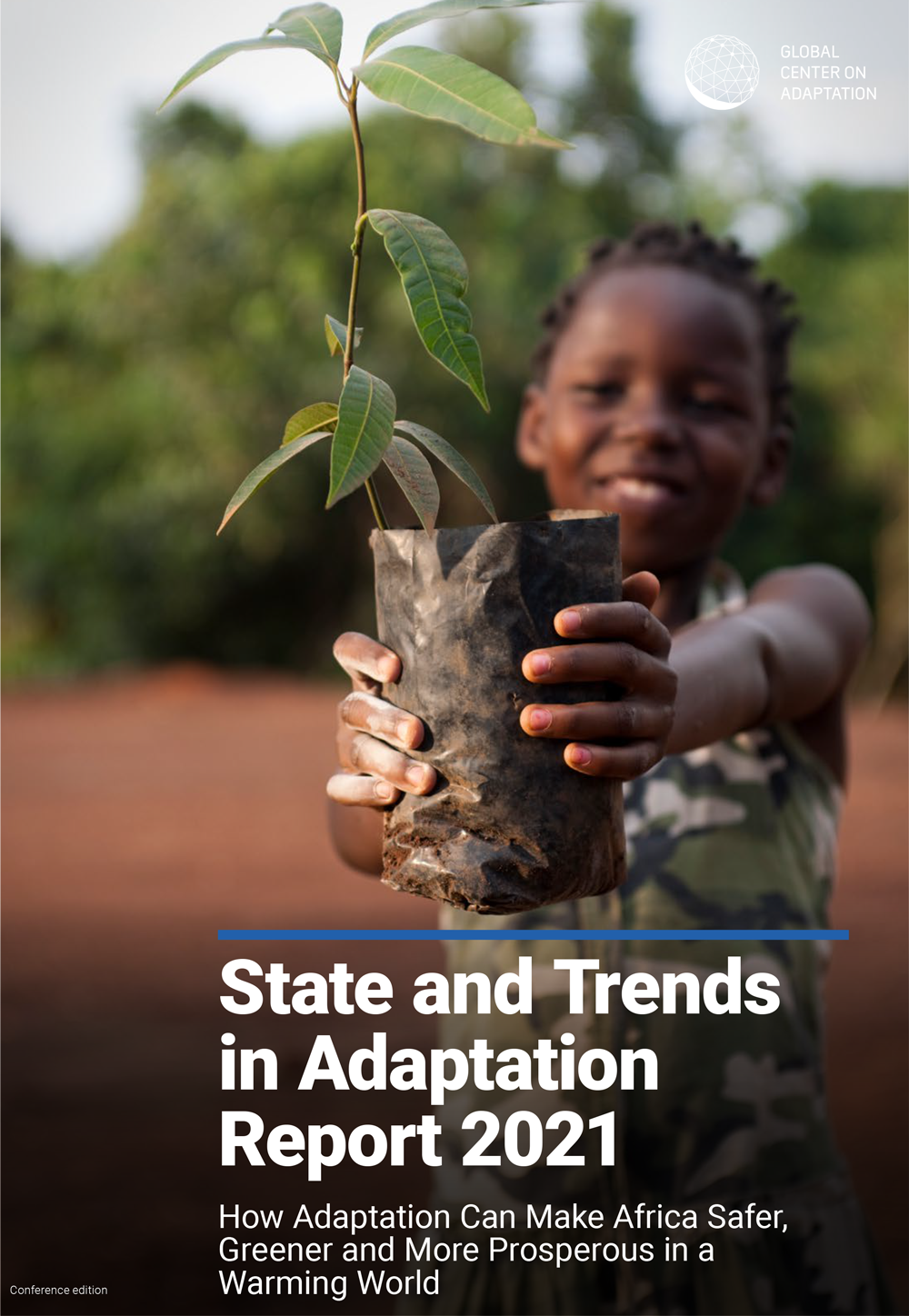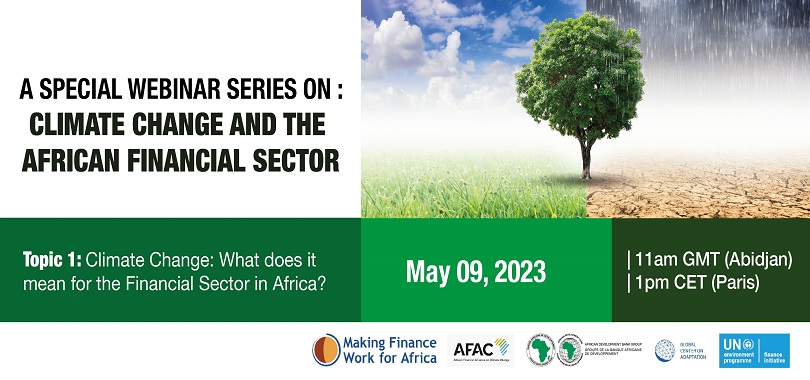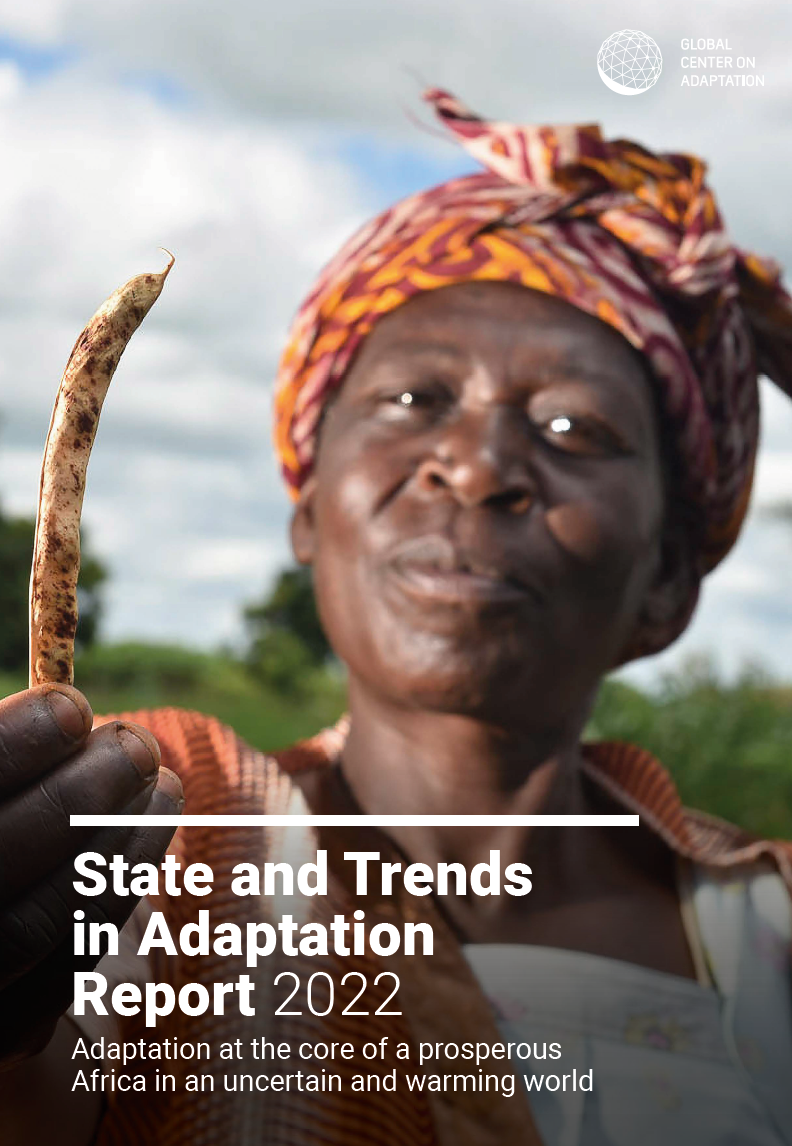Webinar 1: Climate Change: What does it mean for the Financial Sector in Africa?
- See webinar recording and reference the presentation
Financial institutions can play an important role in society’s adaptation to climate change risks mitigation. This webinar will highlight risks and opportunities that climate change poses for the financial sector in Africa and discuss how financial institutions can best respond to these, in a sustainable manner. In particular, the webinar is expected to:
- Raise awareness on climate change within the financial industry in Africa and facilitate a broader dialogue aimed at integrating climate change considerations;
- Clarify the pivotal role the financial sector can play in mitigating climate change risks and adapting to its effects; and
- Present examples of transformative change in financial institutions’ practices
- Paul SMITH has worked for the climate team at the United Nations’ Environment Programme Finance Initiative (UNEP FI) for over four years. Paul leads UNEP FI’s climate adaptation and physical risk work supporting the Climate Risk Programme, the Climate Adaptation Working Group of the Principles for Responsible Banking and the Adaptation and Resilience Investor Collaborative (ARIC). He also leads on climate policy in partnership with the Investor Agenda and has co-authored The Climate Risk Landscape, Physically Fit? and Adapting to a New Climate, as well as contributing to Climate Risk: Managing the Financial Risk and Funding the Transition
- Anthony NYONG is the Director of Climate Change and Green Growth at the AfDB. Mr. Nyong has about 30 years of experience in environmental and natural resources management, renewable energy and green growth. He was a Coordinating Lead Author for the IPCC Fourth Assessment Report and a member of the IPCC Task Group on Data and Scenario Support for Impact and Climate Analysis.
- David ASHIAGBOR is the Chief Financial Sector Strategy Officer in the Financial Sector Development Department of the African Development Bank. He is currently leading the design and development of the Bank’s new Financial Sector Development Strategy, in addition to supporting the Director on policy and strategy issues.
- Marina FINKEN is the Partnership Coordinator for Making Finance Work For Africa (MFW4A). She is an experienced Finance Professional who, before joining MFW4A had a successful career within Big 4 firms, providing audit and advisory services to large Banking groups and other financial services entities.
16 May 2023. This webinar discussed how climate-related risks threaten the functioning of banking institutions as well as the stability of the financial system.
- Play the webinar recording and reference the presentation
Climate change and climate policy affect the balance sheets and business models of banks in different ways. African banks are vulnerable to the increasing frequency and severity of climate change shocks. They are also increasingly aware of the importance of adopting green financing principles, seeking to address risks and more importantly, to grasp new opportunities.
However, only 17% of banks have so far introduced specific green financing products, and these are estimated to account for only 2-20% of their portfolio . The webinar discussed how climate-related risks threaten the functioning of banking institutions as well as the stability of the financial system. The discussions also shed light on initiatives of banks to implement sustainable practices and central banks to create an enabling environment for sustainable finance drawing on international best practices.
- The insurance industry is exposed to the risks of climate change and that risk is increasing. Insurers should be aware of these risks and the potential impact on their business. A 2019 global survey found that 72 percent of insurance companies believe climate change will affect their business, but 80 percent of them have not taken significant steps to lessen climate risks. Moreover, insurance companies invest the money from the premiums they collect in the financial markets. They have $582 billion invested in fossil fuels investments that could be devalued as climate risks increase.
- As natural disasters become more frequent and more costly, insurance companies are facing big challenges. If insurers are to weather the storms ahead, they’ll need to make some changes. The insurance industry needs to make substantial changes to deal with its own climate risks. Some of these changes could also enable insurance companies to help speed the transition to a net-zero society.
Resources
MFW4A and TCX (2023 The potential of green energy projects in Africa for dealing with climate change, and how they can be financed. # 15 p.
- This paper provides an overview of green energy potentials in Africa, the challenges faced in their implementation and finally highlights the importance of the availability of local currency financing for these projects.
GCA (2022) State and Trends in Adaptation Report 2022: Adaptation at the Core of a Prosperous Africa in an Uncertain and Warming World # 525 p.
GCA (2021) How Adaptation Can Make Africa Safer,Greener and More Prosperous in a Warming World # 576 p.

State and Trends in Adaptation 2022 Report: Africa (Volume 2) expands on the in-depth analyses provided in State and Trends in Adaptation 2021 by widening its scope of sector and thematic areas, regional coverage, and undertaking deep dives at the country level for specific topics.
As the 2021 report documented, Africa is particularly vulnerable to these extreme impacts of climate change. It faces exponential collateral damage, posing systemic risks to its economies, infrastructure investments, water, and food systems, public health, agriculture, and livelihoods, threatening to undo its hard-won development and reverse decades of economic progress. The first report included topics ranging from food systems to gender and water that are not repeated.
In particular, the 2022 report covers three major topics in its three sections.
- The first point of focus is boosting the amount of finance that is available for adaptation and using that money in the most effective ways. Some of the key opportunities lie in the private sector, where companies can not only reduce their own risks from the impacts of climate change but also take advantage of new markets and new businesses in the adaptation space
- The second topic is how to accelerate progress on adaptation in individual sectors, such as agriculture or cities. This section also provides a comprehensive evaluation of the innovative Africa Adaptation Acceleration Program (AAAP), developed as an Africa-owned and Africa-led response to the climate crisis. The AAAP supports programs across multiple sectors.
- The third section covers the themes and opportunities that cut across multiple sectors. They include improving education, empowering youth and stimulating entrepreneurship, improving security, and identifying further research to help unlock the many benefits of successful adaptation measures.
Launch State and Trends in Adaptation 2022 Report
4 November 2022. The global launch of STA22 was a hybrid press briefing, featuring in-person participation from GCA’s global headquarters in Rotterdam with high-level discussants joining live online, and a livestream broadcast for media and the public.- Professor Patrick Verkooijen, CEO of the Global Center on Adaptation
- Amina Mohammed, Deputy Secretary-General of the United Nations
- Akinwumi Adesina, President of the African Development Bank Group
- Josefa Leonel Correia Sacko, Commissioner for Rural Economy and Agriculture for the African Union Commission
- Dr. Ede Ijjasz-Vásquez and Professor Jamal Saghir, Co-Directors of State and Trends in Adaptation in Africa 2022 Commenting on the report’s findings
The Africa Adaptation Acceleration Program (AAAP)
This program was developed by African Development Bank and the Global Center on Adaptation (GCA) to mobilize $25 billion by 2025 to implement, scale and accelerate climate adaptation across the African continent. AAAP works across four bold interconnected pillars to achieve transformational results:
- Climate-Smart Digital Technologies for Agriculture and Food Security;
- African Infrastructure Resilience Accelerator;
- Youth Empowerment for Entrepreneurship and Job Creation in Climate Adaptation and Resilience and Innovative Financial Initiatives for Africa.







No comments:
Post a Comment